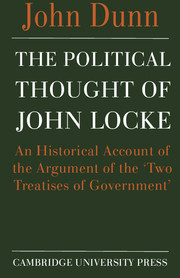 The Political Thought of John Locke
The Political Thought of John Locke Book contents
- Frontmatter
- Contents
- Preface
- AUTHOR'S NOTE
- Dedication
- PART I
- PART II
- PART III
- 8 The Premises of the Argument
- 9 The State of Nature
- 10 The Creation of the Legitimate Polity
- 11 Prerogative
- 12 Public Good and Reason of State
- 13 The Conditions for Legitimate Resistance
- 14 The Law of Nature
- PART IV
- PART V
- Bibliography
- Index
- Frontmatter
- Contents
- Preface
- AUTHOR'S NOTE
- Dedication
- PART I
- PART II
- PART III
- 8 The Premises of the Argument
- 9 The State of Nature
- 10 The Creation of the Legitimate Polity
- 11 Prerogative
- 12 Public Good and Reason of State
- 13 The Conditions for Legitimate Resistance
- 14 The Law of Nature
- PART IV
- PART V
- Bibliography
- Index
Summary
The human race belongs to the created order of nature. But it belongs to it in a highly distinctive way. Human beings have free will and they speak languages. Hence they not only live in a unitary history, the story of the created world; they also make their own history and are at least capable of knowing it. The societies in which they live have their own rules, formal and informal, and men can know these and recognize their historically distinctive character, can know that the laws and the constitution of England differ from those of France or Spain and have done so over long periods of time. Because these laws and values are historical artefacts, linguistically expressed and thus preserved through time from one generation to another, and because they represent the form in which men are educated morally, men are to some degree at the mercy of language and of history, perhaps at times even bewitched by them. Language, even though it can be employed with great care for the statement of the truth, is a conventional material—and normally not employed with any care at all. There is thus a problem over how men can learn to talk coherently about such values or laws and how they can escape the bewitchments of history, that fetishism of the existing moral vocabulary which is the moral consciousness of most men.
- Type
- Chapter
- Information
- The Political Thought of John LockeAn Historical Account of the Argument of the 'Two Treatises of Government', pp. 96 - 119Publisher: Cambridge University PressPrint publication year: 1969


